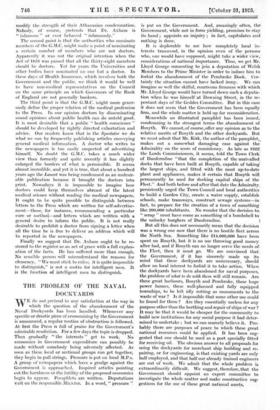THE PROBLEM OF THE NAVAL DOCKYARDS
INTE do not pretend to any satisfaction at the way in which the question of the abandonment of the Naval Dockyards has been handled. Whenever any specific or drastic piece of economizing by the Government is announced, a regular routine of obstruction is followed. At first the Press is full of praise for the Government's admirable resolution. For a few days the topic is dropped. Then gradually " the interests " get to work. • No economies in Government expenditure can possibly be made without somebody being adversely affected. As soon as these local or sectional groups can get together, they begin to pull strings. Pressure is put on local M.P.s.
A group of newspapers which have a grudge against the Government is approached. Inspired articles pointing out the harshness or the futility of the proposed economies begin to appear. Panphlets are written. Deputations wait on the responsible Miniter. In a word, " pressure 7 is put on the Government. And, amazingly often, the Government, while not in form yielding, promises to stay its hand ; appoints an inquiry ; in fact, capitulates and nothing is done.
It is deplorable to see how completely local in- terests transcend, in the opinion even of the persons. who, one would have supposed, might take a wider view,' considerations of national importance. Thus, we get Mr. Lloyd George consenting to join a deputation of Welsh Members to the Prime Minister in order to induce him to forbid the abandonment of the Pembroke Dock. Cer- tainly the situation cannot have lacked irony. We can imagine so well the skilful, courteous firmness with which Mr. Lloyd George would have turned down such a deputa- tion when he was himself at Downing Street, in the re- pentant days of the Geddes Committee. But in this case it does not seem that the Government has been equally firm, and the whole matter is held up for reconsideration.
Meanwhile an illustrated pamphlet has been issued,i condemning in the strongest terms the abandonment of Rosyth. We cannot, of course, offer any opinion as to the relative merits of Rosyth and the other dockyards. But we must admit that Mr. Kirk, the author of the pamphlet,, makes out a somewhat damaging case against the, Admirality on the score of consistency. As late as 1922 the Lords Commissioners, it seems, told the Town Clerk of Dunfermline "that the completion of the unrivalled docks that have been built at Rosyth, capable of taking the largest ships, and fitted with the most up-to-date plant and appliances, makes it certain that Rosyth will permanently be used for docking capital ships of the Fleet." And both before and after that date the Admiralty, persistently urged the Town Council and local authorities to build a Garden City, create a water supply, establish schools, make tramways, construct sewage systems—in: fact, to prepare for the creation of a town of something like 200,000 inhabitants. No wonder that the decision to, " scrap " must have come as something of a bombshell to the unlucky burghers of Dunfermline.
But all this does not necessarily mean that the decision was a wrong one now that there is no hostile fleet across the North Sea. Something like £14,000,000 have been spent on Rosyth, but it is no use throwing good money after bad, and if Rosyth can no longer serve the needs of, the Fleet, then it must go. We are convinced that, the Government, if it has sincerely made up its mind that these dockyards are unnecessary, should allow no local interest to forbid it to take action. When the dockyards have been abandoned for naval purposes, the problem of what to do with them will still remain. Are these great harbours, Rosyth and Pembroke, these huge power houses, these well-planned and fully equipped townships, to be left idly rotting as monuments to the waste of war ? Is it impossible that some other use could be found for them ? Are they essentially useless for any purpose other than the berthing and repair of ships of war ? It may be that it would be cheaper for the community to build new institutions for any social purpose it had deter- mined to undertake ; but we can scarcely believe it. Pro- bably there are purposes of peace to which these great national resources could be applied. It has been sug- gested that one should be used as a port specially fitted for receiving oil. The obvious answer to all proposals for using the dockyards for merchant ship building and re- pairing, or for engineering, is that existing yards are only half employed, and that half our already trained engineers are out of work. We admit that the whole problem is extraordinarily difficult. We suggest, therefore, that the Government should appoint an expert committee to investigate the whole matter and make constructive sug- gestions for the use of these great national assets.






























































 Previous page
Previous page